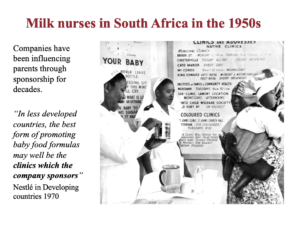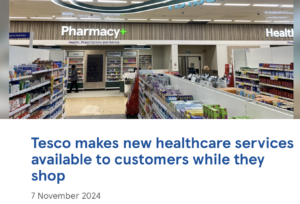STOP Press
STOP PRESS: Following the criticism Tesco drops its Danone sponsored scheme.
Tesco/Danone targets mothers in UK High Streets


Tesco is offering customers a package of health services while they shop in one of its stores with a planned roll-out to other stores. The scheme involves a range services (oral health, menopause support, etc with various companies (Bupa, Stella, etc.) but its inclusion of Danone the world’s second biggest baby milk manufacturer and distributor blatantly violates the International Code.
- Aptaclub from Danone – For any questions about pregnancy, childbirth or feeding little ones? Talk to a healthcare professional in private for support at every step of the parenting journey. Book an appointment here
- Customers can either approach the midwives in store or make a booking here
- What topic would you like to discuss? Our dedicated in store professional is here to support you with a range of topics from pregnancy guidance and including maternal mental & physical health to infant feeding, including breastfeeding, feeding concerns and weaning. More details on our full range of services can be found on the booking form when selecting your appointment.Please note: this is an advisory service only. All formal appointments should be maintained with your midwife as per NHS guidelines. We are unable to provide any medical treatments or tests in-store.
Danone is clearly exploiting loopholes in UK legislation before the Competition Market Authority (CMA) delivers its recommendations in early 2025. the CMA interim report was instigated because of the concerns about the high prices of Danone and Nestlé formulas.
For more information on the UK law see the Baby Feeding Law Group: We will be submitting comments and suggestions before the deadline 28th November, urging the Government to bring the UK fully into line with the International Code and Resolutions. This would protect all babies however they are fed. Here is an interim statement
Statistics
- Prices for baby formula in the UK rose by 18-36%, depending on the brand, over the 2 years between December 2021 and December 2023.
- The infant formula market is highly concentrated: just 3 firms account for over 90% of supply.
- Evidence reviewed by the CMA shows that parents could make a saving of up to £300-500 over a baby’s first year of life by switching to a lower priced brand.
. Competition and Markets Authority 8 November 2024
COMMISSION DELEGATED REGULATION (EU) 2016/127of 25 September 2015 supplementing Regulation (EU) No 609/2013 of the European Parliament and of the Council as regards the specific compositional and information requirements for infant formula and follow-on formula and as regards requirements on information relating to infant and young child feeding
Article 10. Requirements for promotional and commercial practices for infant formula
1. Advertising of infant formula shall be restricted to publications specialising in baby care and scientific publications Member States may further restrict or prohibit such advertising. Such advertising shall contain only information of a scientific and factual nature. Such information shall not imply or create a belief that bottle-feeding is equivalent or superior to breast feeding.
2. There shall be no point-of-sale advertising, giving of samples or any other promotional device to induce sales of infant formula directly to the consumer at the retail level, such as special displays, discount coupons, premiums, special sales, loss-leaders and tie-in sales.
3. Manufacturers and distributors of infant formula shall not provide, to the general public or to pregnant women, mothers or members of their families, free or low-priced products, samples or any other promotional gifts, either directly or indirectly via the health care system or health workers.
4. Donations or low-price sales of supplies of infant formula to institutions or organisations, whether for use in the institutions or for distribution outside them, shall only be used by or distributed for infants who have to be fed on infant formula and only for as long as required by such infants.
